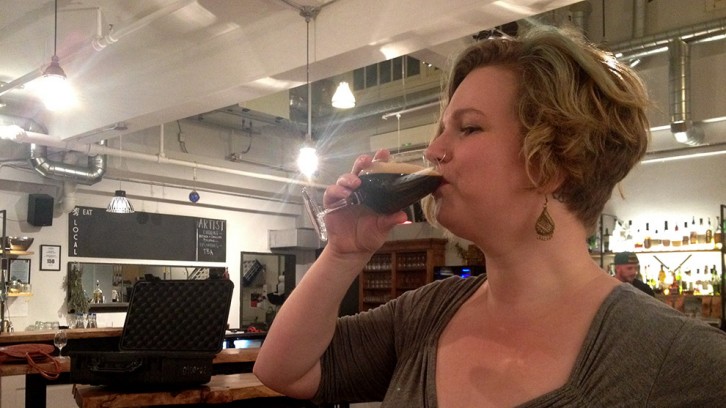Beer
Certified cicerones find job opportunities in big breweries
Soon-to-be beer experts looking to work for breweries in Nova Scotia might be better off sticking with the big leagues

caption

caption
Beer experts, unlike wine experts, swallow the beer to get the full taste.Beer experts are swirling, sniffing and sipping their way into the Nova Scotia job market.
“Beer is kind of booming right now,” says Angeline MacLennan. “It’s a good time for beer, so it’s a good time for beer education.”
Cicerones are to beer what sommeliers are to wine: experts who provide an in-depth look at the flavours, history and science behind the brew. MacLennan is one of three certified cicerones in Nova Scotia.
MacLennan said cicerones can be hired to host beer tastings or house parties, or they can become instructors. However, she said many work in restaurants and bars.
‘It took a little while to catch on’
Craft and start-up breweries aren’t ready to provide certified cicerones with jobs to match their specific skills yet — but larger breweries are making room.
Six members of Labatt’s sales and support teams in Nova Scotia have completed level one of the cicerone program with four more scheduled to complete level one before the end of the year. Labatt covers the cost of the program for their employees.
“We believe strongly that our team should always be striving to be better,” said Wade Keller, who works at corporate affairs for Labatt’s Atlantic region. “Clearly if you are in the business of selling beer, having some training or knowledge in what beer is all about will be beneficial, whether that is around the different styles of beer, the quality of beer or food pairings.”
Mirella Amato, the only Master Cicerone in Canada, is the Global Director of Beer Knowledge with Labatt.
“It took a little while to catch on,” said Keller. “Now that it is recognized as being a valuable resource, we are eager to have our team members take part.”
The cicerone program was developed in the U.S. in 2008.
‘Jacks-and-Jills of all trades’
Cicerones hoping to provide knowledge of a restaurant’s beer selection and food pairings may be out of luck.
Gordon Stewart, executive director of the Restaurant Association of Nova Scotia, said there are limited opportunities for cicerones in the restaurant industry.
Similarly, smaller breweries aren’t prepared to designate cicerone-certified positions due to their small-scale operations.
Andrew Murphy of Unfiltered Brewing said all the employees for their brewery are people they already knew.
“It’s far more important to us that we have people we know, to be honest, and to have an attitude we like, than that they have a certification,” said Murphy.
Josh Counsil of Good Robot Brewing Co. said the company hires people with a passion for beer and the willingness to learn, but not necessarily someone with the certification.
“I’d love to have someone who could give candid, proper feedback on our beer,” said Counsil of cicerones.
Counsil said Good Robot hasn’t sought out cicerones specifically, but hasn’t been approached by any either.
“With startups you want Jacks-and-Jills of all trades. You want people who are not only going to bar-tend, but also drive the delivery truck when we need them to, keep [the] kegs clean,” said Counsil.
‘Everyone drinks beer’
Angeline MacLennan helped to develop a four-week workshop for hopeful beer-lovers to prepare for the cicerone certification exam. The last exam in Nova Scotia took place on June 6.
Classes are being held by the Canadian Association of Professional Sommeliers and cost $260. The separate, second-half of the workshop is more intensive and the association pays for students to take the cicerone exam.
The first class of the program was held at the Lion and Bright Cafe Wine Bar on Oct. 13, with 8-10 people participating.
Students were introduced to basic concepts of making and selling beer, from preparing ingredients to packaging the product. At the end of class, MacLennan brought out four growlers, two bottles and three cans of beer for students to sample.
Students were mostly people already in the industry, from hospitality workers to Nova Scotia Liquor Corporation employees to Dalhousie professors.
“Everyone drinks beer, even if it’s shitty beer,” said MacLennan. “I think there’s just as enough room for beer in the culinary world as wine.”


C
Chris
J
Jill Morgan